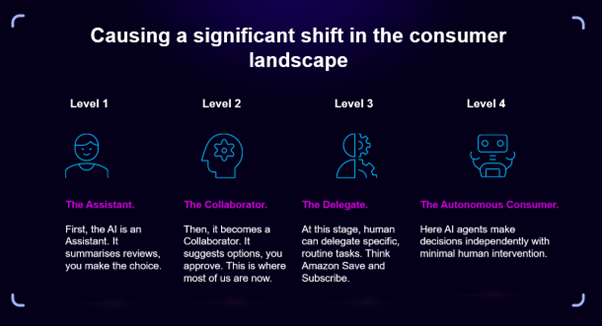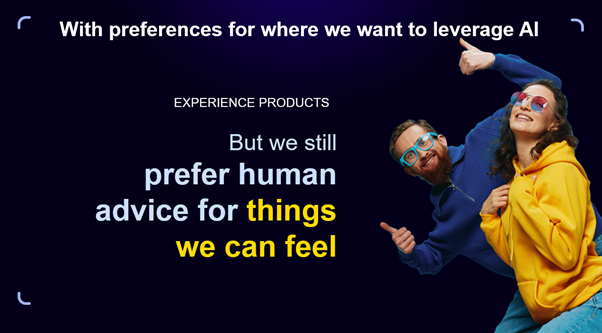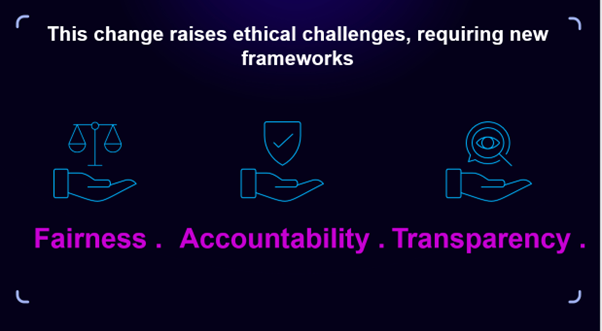It’s time to rethink how we approach market research in a world where AI-powered agents are shaping consumer choices. The landscape is shifting fast: artificial intelligence isn’t just influencing what people buy—it’s making the decisions itself.
This evolution challenges the very foundations of market research, urging us to understand a new kind of consumer: one that’s not human, but algorithmic. To stay ahead, our industry must adapt, embracing the opportunities and complexities of this AI-driven era.
The algorithmic consumer emerges
Over a third of global consumers already use AI to shop, a 47% increase in just one year. More significantly, 58% have replaced traditional search engines with generative AI tools for product recommendations. This marks the emergence of the "non-human consumer," where decisions are increasingly made by AI systems rather than solely by humans.
This shift raises a critical question for market researchers: when AI systems make purchasing decisions, who is the actual consumer being studied? The traditional assumption that consumers can articulate their preferences becomes problematic when the decision-maker is an algorithm operating with minimal human oversight.
Understanding the spectrum of AI consumer independence
AI-mediated consumption exists across a spectrum of four distinct levels, each requiring different research approaches:

Level 1: The Assisted Consumer - AI organizes information while humans retain full decision-making control. Traditional research methodologies remain largely applicable.
Level 2: The Collaborative Consumer - AI actively recommends and shapes options, with humans providing final approval. Research shows 71% of consumers want generative AI integrated into their shopping experiences, indicating this level represents current mainstream behavior.
Level 3: The Delegating Consumer - Humans set parameters while AI handles routine purchasing tasks. Amazon's "Subscribe & Save" program, used by over 100 million customers, exemplifies this level where humans establish preferences and approval thresholds while AI manages timing, quantities, and supplier selection.
Level 4: The Autonomous Consumer - AI makes decisions independently with minimal human intervention. Humans set high-level goals while AI plans, researches, negotiates, and purchases to achieve those objectives. An autonomous AI consumer doesn't experience emotions about brands, doesn't respond to social proof, and may process vastly more information than humans can handle.
The trust paradox: context matters
Consumer trust in AI varies significantly by product type. Research reveals a phenomenon termed "uniqueness neglect", the belief that standardized algorithms cannot grasp individual personal context and needs.
This creates a clear distinction between "search products" and "experience products." For search products defined by objective, comparable attributes (electronics, insurance policies, basic groceries), 39% of consumers and over 50% of Gen Z already use AI for product discovery, according to Salesforce's Connected Shoppers Report 2025.
For experience products that must be personally lived to evaluate (holidays, restaurants), consumers prefer human advice from those with lived experiences. This split has major implications: search products benefit substantially from AI agents, while experience products may not.

The reality of resistance
Despite the rise of algorithmic consumers, major barriers persist. Most consumers are uninterested in AI for purchases, and many would not let AI complete their shopping, even for better deals. Nearly half see AI as a tool for upselling rather than solving problems. Labelling products as “AI” can reduce trust and purchase intent. Surveys show significant distrust and lack of perceived need for AI shopping assistants. Technical issues, such as poor data management and accuracy, further undermine trust. Gartner’s 2025 Hype Cycle shows AI agents are at the “Peak of Inflated Expectations,” with enthusiasm outpacing practical value.
Three fundamental principles for AI-era research
Rather than prescribing specific techniques that may become obsolete quickly, three enduring principles should guide market research as AI continues evolving:
The Transparency Imperative - Many AI systems function as "black boxes" with opaque decision-making logic. Market research has always depended on understanding the "why" behind behaviour patterns. The transparency requirement must extend to understanding data sources that influence AI decisions and mapping these invisible influence networks.
The Multi-Layer Analysis Framework - AI-mediated consumption creates multiple decision-making layers requiring simultaneous analysis: the human layer (original intentions, constraints, values), the AI layer (algorithmic processes interpreting inputs), and the interaction layer (how humans and AI influence each other over time).
The Dynamic Adaptation Principle - Traditional research assumes relatively stable preferences that change gradually. AI systems learn and adapt continuously, potentially altering decision-making patterns based on new data or algorithm updates. This requires shifting from static snapshots to continuous monitoring of evolving systems.
Organizational and methodological implications
AI-era market research demands new skills beyond traditional training, including data science, machine learning, and systems thinking. This shift requires collaboration between market researchers, data scientists, and AI specialists, which may involve hiring new talent or forming technology partnerships. Methodologies must evolve to reverse-engineer AI decision patterns, often through partnerships with AI developers. Client relationships will expand to include technology and platform partners, and researchers will play a key role in helping clients navigate the complexity of AI-mediated markets.
The ethical dimension
The shift toward algorithmic consumption creates complex ethical considerations beyond data privacy. A critical line must be drawn between legitimate personalization and harmful manipulation. Algorithmic harm occurs when systems are designed to identify and exploit consumer cognitive biases or lack of sophistication.

Three principles must be rigorously applied:
- Fairness demands auditing training data to ensure it doesn't spread societal biases related to race, gender, or income
- Accountability requires clear governance structures determining responsibility when autonomous agents make harmful decisions
- Transparency or "explainability" ensures agent decision-making processes remain understandable, countering the "black box" problem that erodes trust
In addition, personalized AI agents trained on individuals' entire digital lives raise new questions about privacy and research ethics. Dedicated AI Agent Compliance Frameworks are needed to ensure these entities operate responsibly.
Preparing for multiple futures
The shift from human to autonomous consumer agency marks the most significant change in purchasing behavior since mass media. Regardless of whether the future is fully autonomous or collaborative, market research must adapt.
Strategic preparation should focus on scenario-based capabilities, including:
- Developing modular skills such as data analysis, algorithmic thinking, and systems approaches
- Maintaining strong traditional research methods
- Building expertise in technology and data science
- Creating frameworks to define “preference” in AI-driven choices
- Keeping human values central despite technological change
Market research’s core mission—to understand and influence decision-making—remains. The industry’s strength lies in its ability to adapt to any consumer reality.
Successful professionals will blend deep knowledge of decision-making (human or AI) with flexible methods, guiding businesses through AI complexity while safeguarding human agency and market democracy.
Contact our Kantar experts to learn how your brand can talk to the non-human consumer (LLM GEO), email the AI.Lab@kantar.com




